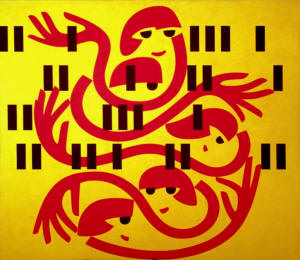Enjoying One Moment at a Time
October 18, 2010
 I
once asked a close friend why he never wore a wrist watch. He
responded that he did not want to be looking frequently at the
time as if time were the most significant factor in his life. As
I reflected on his attitude, I slowly became aware of the
dominating influence of time in my own life. How frequently my
life and its activities are controlled “by the clock,” and how
often I experience time as a tyrannical slave driver. As I
reflected on my friend’s response, I began to wonder why “Father
Time” wasn't gentler, a friend and ally, a brother or sister.
Why, instead of a tyrant, wasn’t “time" a beautiful gift, an
opportunity?
I
once asked a close friend why he never wore a wrist watch. He
responded that he did not want to be looking frequently at the
time as if time were the most significant factor in his life. As
I reflected on his attitude, I slowly became aware of the
dominating influence of time in my own life. How frequently my
life and its activities are controlled “by the clock,” and how
often I experience time as a tyrannical slave driver. As I
reflected on my friend’s response, I began to wonder why “Father
Time” wasn't gentler, a friend and ally, a brother or sister.
Why, instead of a tyrant, wasn’t “time" a beautiful gift, an
opportunity?
So strong in the life of each of us is the society-fostered
value of “getting things done” that time cannot help but become
an adversary. From the simple events of our everyday lives to
the larger issues of life itself and its significance, our
consciousness is dominated by the absolutizing of functional
values.
Our approach to education is an
interesting example of this functional attitude. Henri Nouwen
points out the irony for our time in the fact that the word
school is derived
from the Latin word
schola meaning leisure or free time. How often, however, are
teachers preoccupied by the concern of “getting all the material
in” before the end of a semester. And how often are students
insistent on “knowing the precise requirements” for a course? It
is not infrequent to hear an “educator” furiously railing
against the injustice of “losing an hour of class time” so that
his students could attend an outside cultural or artistic
activity. “How will I ever complete the course?” is a common
plaint of school teachers.
This “deadline mentality” is reflected
ultimately in our attitude toward life itself.
My life becomes a time “to accomplish something,” “to
make my mark” before “my time” runs out.
Death is the great enemy for us, the final victory of
Tyrant Time, a scandalous event to be delayed, fought against,
avoided and ignored. It is not at all “our sister, the death of
the body” of which St. Francis of Assisi speaks in his
Canticle of the Sun.
For the person who lives on the merely functional level of
his or her personality, “Time” is a mortal enemy. Changing
situations, personal limitations and handicaps, increasing age,
sickness and finally the death of the body all reflect the
contingency and finitude of self as doer. If to be a human
person is merely to function, to manipulate, to determine and
control by one’s own actions, then life truly is, as Thomas
Hobbes wrote, “solitary, poor, nasty, brutish, and short.”
Yet each person, event and objective that one encounters in
life is filled with meaning and mystery far deeper than that
which our pre-transcendent awareness can perceive. For the
teacher, students are not primarily intellects to be filled with
my understandings and interpretations, but they are rather
persons called to enter their unique journey into the mystery
that is their own life call in Christ. Similarly, none of us is
merely the social role we assume, but a living presence to
mystery and the mysterious life of God.
It is in special periods of quiet,
aloneness and reflective meditation that our projects,
anxieties, and even thoughts become stilled that we might simply
attend to the mystery and that our distinctively human capacity
for awe may be evoked.
Our functional, managing, and controlling self can, in a quiet,
reflective and prayerful stepping aside, be stilled that we may
remember who we really are in the world.
From this view, all the persons, situations, and
experiences of our lives can be experienced in their deeper and
awe-filled reality. To live and to act merely from the
functional level of our personality is to confuse the world of
our thoughts with the reality of creation.
When we still our rampant egoism long enough to listen to
God’s Word as it is spoken through the events, persons and
situations of life, we can begin, as Nicholas of Cusa says, to
see with the eye with which God sees and thus offer God’s view
and God’s love to the world.
From this perspective, “Time” truly
becomes “our sister.” “The world and those who dwell in it”
(Psalm 24) are the Lord’s—not ours. All people, events,
situations, time, and life itself are the gifts of a loving God
to us. Each moment of time, with all the richness and
possibility it contains, reveals a fresh and deeper opportunity
to respond to God’s love.